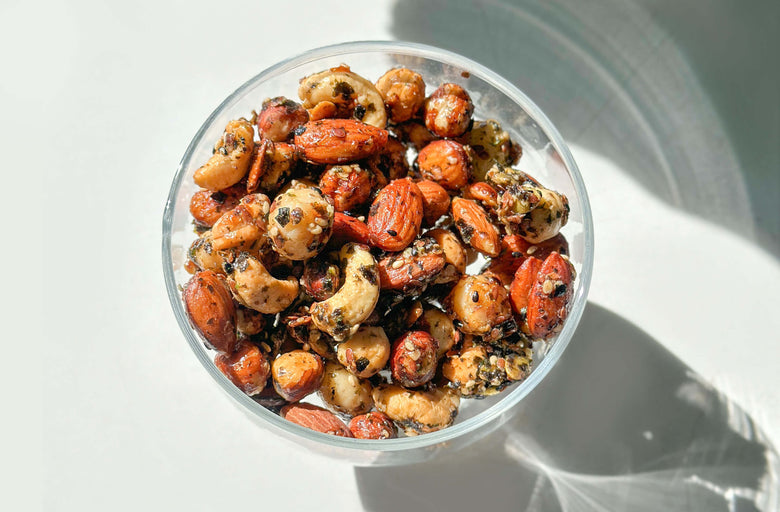With Sakara Science Council Member Maya Feller, MS, RD, CDN
Maya Feller—Sakara Science Council member, nationally recognized nutrition expert, educator, and author—is a voice at the forefront of nourishing the next generation.
In her practice as a registered dietitian, she takes a patient-centered approach from a lens of cultural humility—meaning that she first considers the social determinants of health and then creates a sustainable nutrition plan with each patient leading the charge, kids included. This work naturally extends to her role as a board member of Wellness In The Schools (WITS)—Sakara’s charitable partner and a national nonprofit striving to educate children in public schools about the importance of nutrition.
With her background in mind, Feller is often asked about why nutrition and education are so closely linked, to which she responds that if a kid is hungry or ill-nourished, they can’t focus, learn, or show up as the best version of themselves… A connection that many know to be true on a personal level, but one that’s often overlooked in conversations surrounding childhood nutrition.
“There are no bad kids,” says Feller. “Did anyone ever ask if the child was hungry or well fed?”
With her work at WITS, and as a mom herself, Feller is passionate about sharing her knowledge and helping kids make healthy choices. We sat down with Feller to discuss the importance of nutrition education for children, and how empowered children can become empowered adults.
Planting The Seeds
“Early childhood nutrition behaviors can be indicators of future health outcomes,” says Feller. “When kids are exposed to a variety of healthful foods from an earlier age and are taught practical cooking skills, it improves their relationship to food while teaching lifelong healthy habits. Habits that, in turn, have the potential to reduce their risk of developing chronic conditions.”
To understand how we can build up (or cause detriment to) our health starting at a young age, we have to understand what’s going on on the cellular level. You feed your cells information: Flood your cells with phytonutrients and antioxidants, and they’ll jump for joy, protecting the cell against free radical damage in return. Expose them to highly oxidative things like stress (which some people, to no fault of their own, live under because of a myriad of social and systemic determinants of health, Feller adds), the cell is in crisis.
When the cell’s crisis mode becomes the norm, disease can develop—accumulating into non-communicable metabolic conditions like diabetes, hypertension, cardiovascular disease—generally with a 10-year incubation period. As adults, we consider ourselves agents of our own health, and yet our defining moments are often happening decades earlier than most of us might imagine. For example, Feller says we’re now seeing Type 2 Diabetes—which was once called adult onset diabetes—appear in the pediatric population, as young as 12 and 13, which can be traced back to when kids start eating solid foods.
The earlier we’re able to provide children with a foundation of what it means to eat and live with health in mind, and put systems in place that support and advocate for them on their wellness journeys, the more empowered they’ll be to make these health-promoting decisions as they progress through life.
Wellness In The Schools
It’s not just about teaching kids to make healthy food choices, though; unequal access to high-quality nutrition often prevents children from getting the nutrients they need to prevent future disease. “When we're in marginalized communities, communities who experience food apartheid, communities that are intentionally underfunded, we're now talking about areas where an overwhelming majority of what [kids] have access to is foods with high amounts of added sugars, added salts, saturated and synthetic fats,” says Feller. “And those are the very things that have been linked to the development of non-communicable conditions.”
Enter WITS. Started in 2005 by a group of concerned public school parents and led by Nancy Easton, WITS’ mission is to bring children in public schools across the country nutritious food, nutrition education, cooking, and physical activity. By representing the communities they’re in, working on policy, and shifting the conversation to prioritize the health and well-being of local children, WITS is making strides to illustrate the importance of childhood nutrition—to kids, to schools, and to communities.
“It can take anywhere from 10 plus exposures to a new food before a child accepts a new food, especially something that's not readily accessible to them,” says Feller. “Wellness In The Schools really being within a school and within a community for time allows kids to have that exposure so that they can learn about the food and have the opportunity to work with it.”
To further support WITS’ mission—and to empower future generations to sit in the driver’s seat of their own health—WITS became one of our partner organizations at Sakara. In the past year, we’ve co-created a nutrition lesson for students based on our Nutrition Pillar “Eat Your Water,” distributed delicious (and nutritious) breakfasts to a NYC school with a take-home lesson on natural and artificial sugar, and sent meals and snacks to our partner schools for Teacher Appreciation Day.
An Ideal School Lunch
Feller sees the school cafeteria as another place for kids to be nourished, championing a vision beyond the “unhealthy” or just-plain-less-than-appetizing stigma attached to public school lunch offerings. Studies show that throughout the country the eating of school lunch declines as kids get older, along with their healthy eating index (or fruit and vegetable intake). While Feller notes that correlation doesn’t equal causation, she acknowledges the opportunity within schools to nourish kids with robust and balanced meals, and advocates for more programs like WITS to be involved.
“The best school lunch is really the one that a child will eat that gives them the energy so that they can actually be attentive and that they can learn and play,” says Feller. “So many kids are like, ‘School is not fun.’ And if you're hungry, school is not a fun place.”
“Can school lunches stand to be improved?,” Feller continues. “100% unequivocally. But you know, do we want kids eating food? Absolutely. Do we want policies in place where there's more wellness in the school? Organizations in places that are advocating for a shift in what's included in the lunches? Yes. But let's start with getting kids to eat a nourishing meal day-after-day so that they can actually participate in school and be there fully.”
Want more from Maya Feller? Stay tuned for her new cookbook, Eating from Our Roots: 80+ Healthy Home-Cooked Favorites from Cultures Around the World, set to launch in January 2023.






